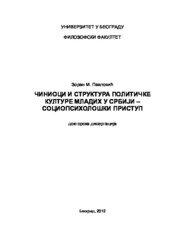Činioci i struktura političke kulture mladih u Srbiji - sociopsihološki pristup
Factors and structure of the youth political culture in Serbia - the socio-psychological approach
| dc.contributor.advisor | Kuzmanović, Bora | |
| dc.contributor.other | Pantić, Dragomir | |
| dc.contributor.other | Popadić, Dragan | |
| dc.contributor.other | Petrović, Nebojša | |
| dc.creator | Pavlović, Zoran M. | |
| dc.date.accessioned | 2016-01-05T12:52:24Z | |
| dc.date.available | 2016-01-05T12:52:24Z | |
| dc.date.available | 2020-07-03T09:57:32Z | |
| dc.date.issued | 2012-06-27 | |
| dc.identifier.uri | https://nardus.mpn.gov.rs/handle/123456789/3233 | |
| dc.identifier.uri | http://eteze.bg.ac.rs/application/showtheses?thesesId=391 | |
| dc.identifier.uri | https://fedorabg.bg.ac.rs/fedora/get/o:6085/bdef:Content/download | |
| dc.identifier.uri | http://vbs.rs/scripts/cobiss?command=DISPLAY&base=70036&RID=522099607 | |
| dc.description.abstract | Predmet rada su činioci i struktura političke kulture mladih u Srbiji. Politička kultura shvaćena je kao sveukupnost političkih i politički relevantnih orijentacija među pripadnicima jedne političke zajednice koja obuhvata nekoliko tipova orijentacije: kognitivne, afektivne, motivacione, vrednosne i ponašajne. | sr |
| dc.description.abstract | The paper explores the factors and structure of youth political culture in Serbia. Political culture is defined as a comprehensive sum of political and politically relevant orientations of the members of a political community and comprises several types of orientations: cognitive, affective, motivational, evaluative and behavioural. Accordingly, five components of youth political culture were distinguished and operationalised by a large number of indicators. The empirical basis for the thesis is a survey conducted in 25 randomly selected secondary schools from the city of Belgrade. The total of 788 students from four different types of secondary school participated in the research: grammar schools (N=202), technical (N=207), economic (N=211) and medical (N=168). The sample was restricted to students of the final year (average age M=18.10, SD=.40). Three-quarters of students (75%) in the sample attend urban secondary schools and one quarter suburban (25%). There were more female participants (58%) than male (42%). Research results indicate that the level of youth political knowledge is low. The majority are not informed about topical social and political issues nor acquainted with certain basic rules regarding the functioning of the Serbian political system, such as the election threshold, government composition or the number of MPs. The prevailing feelings towards numerous analysed political objects are negative. Young people are highly dissatisfied with the current socioeconomic situation. The President, the Government, the Parliament, police, judiciary, the European Union or NATO, are not much trusted. Political cynicism is dominant, while for the majority politics is not the field of interest nor is considered important in life. Most students believe that they cannot influence political affairs (however, surprisingly, they are ready to vote in the following elections) while their opinions on social activism are divided. The attitude towards pro-system values is often ambiguous and vague. The attitude towards democracy is predominantly positive. However, the majority of students do not perceive favourably the newly established mechanisms and institutions of market economy and are hence more inclined towards the socialist than (pro-)market orientation. It can be said that they do not support the freedom of speech, multi-party system and rule of law. | en |
| dc.format | application/pdf | |
| dc.language | sr | |
| dc.publisher | Универзитет у Београду, Филозофски факултет | sr |
| dc.relation | info:eu-repo/grantAgreement/MESTD/Integrated and Interdisciplinary Research (IIR or III)/47010/RS// | |
| dc.rights | openAccess | en |
| dc.rights.uri | https://creativecommons.org/licenses/by-nc-sa/4.0/ | |
| dc.source | Универзитет у Београду | sr |
| dc.subject | politička kultura | sr |
| dc.subject | political culture | en |
| dc.subject | političko znanje | sr |
| dc.subject | politička motivacija | sr |
| dc.subject | vrednosne orijentacije | sr |
| dc.subject | političko ponašanje | sr |
| dc.subject | mladi | sr |
| dc.subject | Srbija | sr |
| dc.subject | political knowledge | en |
| dc.subject | political motivation | en |
| dc.subject | political affects | en |
| dc.subject | value orientations | en |
| dc.subject | political behaviour | en |
| dc.subject | youth | en |
| dc.subject | Serbia | en |
| dc.title | Činioci i struktura političke kulture mladih u Srbiji - sociopsihološki pristup | sr |
| dc.title | Factors and structure of the youth political culture in Serbia - the socio-psychological approach | en |
| dc.type | doctoralThesis | en |
| dc.rights.license | BY-NC-SA | |
| dcterms.abstract | Кузмановић, Бора; Попадић, Драган; Петровић, Небојша; Пантић, Драгомир; Павловић, Зоран М.; Чиниоци и структура политичке културе младих у Србији - социопсихолошки приступ; Чиниоци и структура политичке културе младих у Србији - социопсихолошки приступ; | |
| dc.identifier.fulltext | https://nardus.mpn.gov.rs/bitstream/id/26323/Disertacija.pdf | |
| dc.identifier.fulltext | http://nardus.mpn.gov.rs/bitstream/id/26323/Disertacija.pdf | |
| dc.identifier.doi | 10.2298/bg20120627pavlovic | |
| dc.identifier.rcub | https://hdl.handle.net/21.15107/rcub_nardus_3233 |


